| |
 |
Mongolian Lessons
by Leon of Leon's Planet |
 |
I lived in Mongolia for 5 years!
|
Table of Contents |
|
First, before we get to the
lessons, I'd like to let you know of some special features on
this page!
|
Mongolian Names!
and their meanings (in English)
|
Mongolian
Song
and translation into English |
Compare
Mongolian
to Other Languages
|
Mongolian
Comic Strip
translated into English |
|
General Lessons
|
|
Mongolian Study List
 |
Mongolian Study List
 |
| The
Mongolian (Cyrillic) alphabet |
My
opinion about Google Translate (for Mongolian) |
| Some basic,
useful, every-day phrases
(Including greetings, shopping, buying & ordering food)
|
Mongolian
numbers |
| Mongolian
pronouns |
Mongolian
Vocab: animals |
| Mongolian
Vocab: colors |
Mongolian
Vocab: nature |
| More
Mongolian Phrases: funny, fun, hopefully useful |
Mongolian
Grammar Section |
| Mongolian
noun/verb suffixes: Shuu & Dee |
Mongolian
adjective suffix: Yumaa |
| Mongolian
noun suffix: Bish |
Mongolian
conjunctions (and, but, when, because, so) |
| The
Mongolian Conditional |
Mongolian
"Can" / "To be able" |
| The 2
"Want" s (Mongolian has 2
words for "want"). |
The 3 "Because"
s (Mongolian has 3 words for
"because"). |
| Verb
Tenses |
Mongolian active and passive
voice |
| ....for....~ing |
The 3
"Like"s (Mongolian has 3
words for "like"). |
| Mongolian
Names (and their meanings) |
Mongolian
Song (by Mongolian Group: Kiwi) w/ lyrics |
"Happy New Year!" in Mongolian

Шинэ
оны
мэнд хүргэе!
(Shine Onii Mend Khurgiye!)
|
|
Mongolian Alphabet
I should mention that the commonly used Romanization of
certain sounds is severely lacking in accuracy, as three different Mongolian sounds/letters
are all Romanized as "u". That sucks!
...and therefore I have devised my own
Romanization, which is the same (in some cases) to the Korean NEW Romanization
(adopted in the year 2000).
Cyrillic
Letter |
Mongolian
Romanization
(has problems) |
Leon's
Romanization
(no problems) |
APA
(American Phonetic Alphabet) |
IPA
(Int'l Phonetic Alphabet) |
Sounds
like... |
...in
this
English
word |
Sounds
like
This
Korean
letter |
Sounds
like
this
Chinese
pinyin |
| A,a |
A,a |
A,a |
ä |
a |
a |
father |
ㅏ |
a |
| Б,б |
B,b |
B,b |
b |
b |
b |
bog |
ㅂ |
b |
| Г,г |
G,g |
G,g |
g |
g |
g |
go |
ㄱ |
g |
| Д,д |
D,d |
D,d |
d |
d |
d |
do |
ㄷ |
d |
| Е,е |
Ye, ye |
Ye,
ye |
y |
je |
ye |
yes |
ㅖ |
ye |
| Ё,ё |
Yo, yo |
Y ,
y ,
y |
y |
jɒ |
ya [UK]
yu [US]
|
yacht [UK]
yum [US]
|
ㅕ |
-none- |
| Ж,ж |
J |
J |
j |
 |
j |
Joe |
ㅈ |
zh, j |
| З,з |
Z,z |
Z,z |
z |
z |
z |
zoo |
-none- |
z |
| И,и |
I,i |
I,i |
_
e |
i: |
e |
eel |
ㅣ |
i |
| K,k |
K,k |
K,k |
k |
k |
k |
kite |
ㅋ |
k |
| Л,л |
L,l |
L,l |
l |
l |
l |
Leon |
ㄹㄹ |
l |
| М,м |
M,m |
M,m |
m |
m |
m |
mummy |
ㅁ |
m |
| Н,н |
N,n |
N,n |
n |
n |
n |
no |
ㄴ |
n |
| O,o |
O,o |

|
 |
ʌ
|
o |
money |
ㅓ |
-none- |
| Ө,ө |
U,u

|
Ø |
ü /  |
 |
u
|
put
|
ㅡ |
e |
| П,п |
P,p |
P,p |
p |
p |
p |
poll |
ㅍ |
p |
| Р,р |
R,r |
R,r |
r |
r |
r |
run |
ㄹ |
r |
| C,c |
S,s |
S,s |
s |
s |
c |
city |
ㅅ
[ + a,e,o,u] |
s |
| Т,т |
T,t |
T,t |
t |
t |
t |
toe |
ㅌ |
t |
| У,у |
U,u

|
 |
_
o |
  |
o |
go |
ㅗ |
o |
| Ү,ү |
U,u

|
U,u
or
V,v |
_
u |
u: |
u |
flu |
ㅜ |
u |
| Ф,ф |
F,f |
F,f |
f |
f |
f |
fog |
-none- |
f |
| X,x |
Kh, kh |
Kh,
kh |
harsh
"h" |
? |
harsh
"h" |
Khan
|
ㅎ |
h |
| Ц,ц |
Ts, ts |
Ts,
ts |
ts |
ts |
ts |
tsunami |
-none- |
c |
| Ч,ч |
Ch, ch |
Ch,
ch |
ch |
 |
ch |
chick |
ㅊ |
ch,
q |
| Ш,ш |
Sh, sh |
Sh,
sh |
sh |
 |
sh |
shame |
ㅅ
(+ ㅣ) |
sh, x |
| Э,э |
E,e |
E,e |
 |
e |
e |
bed |
ㅔ |
e |
| Ю,ю |
Yu, yu |
Yu,
yu |
_
yu |
ju: |
you
U
|
you
Utah
|
ㅠ |
yu |
| Я,я |
Ya, ya |
Ya,
ya |
yä |
ja |
ya |
yahoo! |
ㅑ |
ya |
| В,в |
W,w |
W,w |
w/v |
w/v |
It's
more generally pronounced like a "w". |
win |
ㅘ,
ㅙ,ㅝ |
w |
 Please Notice the Big
Problem Please Notice the Big
Problem
The Mongolian way of Romanizing their language leaves
much to be desired. My only gripe is that 3 different Mongolian vowels (ө,
у, ү)
are Romanized the exact same way (i.e., with the Roman letter "U,u").
They are very different sounds, but English IS a crazy language and those
exact sounds can be written as "u" in English. For instance....
ө =
u in "put";
у
=
ou in "though";
ү
=
u in "flute".
 Solution Solution
Many Mongolians attempt to solve the problem by Romanizing thusly:
ө =
u; у =
u; ү =
v
It is insufficient. So, I shall Romanize
thusly:
ө =
Ø; у =  ;
ү =
v ;
ү =
v
Mongolian Diphthongs
What is a "diphthong"? Well Collins
online dictionary defines it thusly:
"a vowel sound, occupying a single
syllable, during the articulation of which the tongue moves from one position to
another, causing a continual change in vowel quality, as in the pronunciation of
"a" in English "late", during which the tongue moves from the position of (e)
towards (ɪ)."
The Mongolian language has
diphthongs as well. For instance:
"aй"
is pronounced like the short "a" in colloquial speech.
"эй"
is always pronounced /ei/ (long a).
"oй"
can be pronounced /oi/ (as in "toilet"),
but is commonly pronounced /ei/
(long a)
GOOGLE TRANSLATE...
Mongolian language is now on Google Translate (as of December
2013); however, it is severely flawed, as it is with most Asian languages (to
and from English). The reason for this is because different languages have
different ways of saying things. For instance, Mongolians do not say,
"How are you?" They say, "Good are?"
Some Basic, Useful,
Every-day Phrases
(greetings, shopping, ordering food)
PREFACE:
Remember that in typically Romanized
Mongolian "u" =
ө,
у,
ү .
(That means that 3 Mongolian letters/sounds are
represented (typically) by ONE Roman letter "u")
To deal with this
HUGE problem, I (Leon) will Romanize differently; thusly:
ө = Ø
y =  ү
= v
ү
= v
Also, instead of
Romanizing "x" as "kh", I will Romanize
"x" as "x"
Also, instead of Romanizing "c" as "s", I will
Romanize "c" as "c"
(Let's refer to that/this style of Romanizing Mongolian "Leon's
Romanization"). |
| Mongolian |
English
(free translation) |
English
(exact translation) |
Romanized
Mongolian
(Leon's style) |
Sounds
like... |
| Сайн байна
уу? |
Hello, How are you? |
Good are? |
Cain bain- ? ? |
San Ban Oh? |
Notice:
"yy" (in Mongolian Cyrillic)
at the end indicates that the
sentence is an interrogative. (in Mongolian Cyrillic)
at the end indicates that the
sentence is an interrogative. |
| Сайн |
I'm fine. |
Good. |
Cain. |
San |
| Таны нэр хэн бэ? |
What's your name?
(to older or unfamiliar person of same age) |
Your name who are? |
Tani ner
xen be? |
Tahny neer heen beh? |
| чиний нэр хэн бэ? |
What's thy name?
(to younger or familiar person of same age) |
Thy name who
are? |
Chinii ner
xen be? |
Chiny neer heen beh? |
| Миний
нэр бол.... |
My name is.... |
My name is.... |
Minii ner bol.... |
Minii neer bol... |
| Таныг хэн гэдгуу? |
What do you call yourself? |
Yourself who called? |
Tanaig
xen gedg ? ? |
Tah-nik heen gitgo? |
| Чамайг хэн гэдгуу? |
What dost thou
call thyself? |
Thyself who called? |
Chamaig
xen gedguu? |
Chamack heen
gitgo? |
| Намайг _______ гэдэг. |
They call
me ________. |
Me, ______,
am named. |
Namaig _______
gedeg. |
Namack _______ gid k. k. |
| Миний нэрийг ______ гэдэг. |
My name
is ________. |
My name, ______, is called. |
Minii Neriig ______ gedeg. |
Mini neerick ______gid k. k. |
| Та хаанаас ирсэн бэ? |
Where are you from?
(to elder) |
You where-from came? |
Ta xanas
ircen (be)? |
Tah hahnas
eersn (beh)? |
| чи хаанаас ирсэн бэ? |
Where art thou from?
(to younger) |
Thou where-from came? |
Chi xanas
ircen (be)? |
Chee hahnas
eersn (beh)? |
Note:
 the suffix "~aac"
("~ooc,~ØØc, ~ээc") means "from". the suffix "~aac"
("~ooc,~ØØc, ~ээc") means "from". |
| Би ____~аас/ээс ирсэн. |
I am from ________. |
I, ________-from came. |
Bi _______-aas irsen. |
Bee _______-ahs eers n. n. |
| Та
хэдэн
настай вэ? |
How old are you?
(to elder) |
You, how many age(wtih) are? |
Ta xeden
nastai-ve? |
Ta heed n
nahsteh-veh? n
nahsteh-veh? |
| Чи
хэдэн
настай вэ? |
How old are you?
(to younger) |
Thou, how many age(with) art? |
Chi xeden
nastai-ve? |
Chee heed n
nahsteh-veh? n
nahsteh-veh? |
| - |
I am ____ years old. |
I ____ aged-[am]. |
Bi ____ nastai. |
Bee ____ nahsteh. |
| - |
Where's the toilet? |
Zero, where is? |
Neol,
xaana bain-ve? |
N l, hahn
ban-veh? l, hahn
ban-veh? |
| зөөгч
(+ өө) |
Waiter/Waitress/Server |
Server! Waiter! Waitress! |
ZØgchØØ |
Z kch kch  |
Note:
When  calling a person, you must add an ending that
agrees with the
vowels. calling a person, you must add an ending that
agrees with the
vowels. |
Уучлаарай
(commonly used) |
Excuse me
/ I'm sorry |
Forgive, please |
Uuchlaarai |
OHch-lah-ray |
Өршөөгөөрэй
(not used much) |
Excuse me / Pardon me |
Excuse, please |
ØrshØØrØØrei |
 rsh rsh  r r  ray ray |
Note:
The  suffix ~aarai, (~ooroi, ~ØØrØi,
~eerei) means "please". See next "Note" for more details.
suffix ~aarai, (~ooroi, ~ØØrØi,
~eerei) means "please". See next "Note" for more details. |
| Би
монгол хэл
сурмаар байна. |
I want to learn Mongolian language. |
I Mongolian language learn-want + be. |
Bi mongol
xel curmaar baina. |
Bee mongol hill sor-mar ban. |
| _____ дуртай уу? |
Do you like _________? |
________ like? |
________ dortai- ? ? |
_________ dorteh-oh? |
| Нэг пиво өгөөрөй. |
One beer, please. |
One beer, give please. |
Nig pivo ØgØØrei. |
Nick peevoh  g g  reh. reh. |
 Important Note:
Important Note:
I'm told by many Mongolians, that in the case of ordering
food or drink, "ØgØØch"
is actually more polite. (Go figure)
However, even more polite speech would be to use
"awii", which is akin to "I'll take a...." or
"I'll have a...."
And if you are somebody's home and you would like to ultra polite, you
should use "awch bolho?" which is to say, "May I take
a....?" or "May I have a....?"
See below for more details: |
 (I would only use this to familiar server with gentle intonation)
(I would only use this to familiar server with gentle intonation) |
One beer, please. |
One beer, give. |
Nig pivo,
ØgØØch. |
Nick peevoh,  g g  ch. ch. |
 (This is more polite)
(This is more polite) |
I'll have a beer. |
One beer, I'll take. |
Nig pivo, awii. |
Nick peevoh, owie. |
 (This is ultra polite)
(This is ultra polite) |
May I have a beer? |
One beer take-may? |
Nig pivo, awch
bolox  ? ? |
Nick peevoh, ouch bolho? |
| Тооцоо өгөөрөй. |
Bill, please. |
Bill, give please. |
Tootsoo
ØgØØrei. |
Tuh-Tsuh  g g reh.
[APA] reh.
[APA]
T -Ts -Ts
 g g reh.
[IPA] reh.
[IPA]
|
 (This is more polite)
(This is more polite) |
Will you do/make the bill? |
Bill, will do/make? |
Tootsoo
xiine- ? ? |
Tuh-Tsuh hee-neh oh? |
| ямар үнэтэй вэ? |
How much does it cost? |
How much pricey is it? |
Yamar
vnetei we? |
yah-mar un-tey-veh? |
| хэдий
үнэтэй вэ? |
How much does it cost? |
How much pricey is it? |
Xedii
vnetei we? |
Heedee Un-tey-veh? |
| хэд
вэ? (Written. short form) |
How much does it cost? |
How much? |
Xed we? |
Heed veh? |
| хэд
уу? (Colloq. Short form) |
How much does it cost? |
How much? |
Xed uu? |
Heed oh? |
| - |
May I take your order? |
|
Tani
zaxialgiig awch bolox uu? |
|
| - |
Would you like to order? |
|
Ta zahialgaa
ØgØx uu? |
|
| - |
What time is it? |
|
Xeden
tsag bolj bain we? |
|
| - |
How much time [will it take]? |
|
Xer
ix xugatsaa zartcuulax we? |
|
| - |
How long have you been in Mongolia? |
Mongolia-in
come-since how long have you been tarrying? |
Mongold ireed
xer udaj baina? |
Mongold ired here ohdaj ban? |
| - |
I
have been here for 3 years. |
Mongolia-in come-since 3 years became and
exists. |
Mongold ireed 3 jil bolj baina. |
Mongolid ired gorawn jil bolj ban. |
| хэдэн?
хэр
их? |
How many?
How much? |
How many?
How much?
|
Xeden?
Xer ix?
|
Heeden?
Heer ikh?
|
| цаг
хэд вэ? |
What time is it? |
Time how many? |
Tsag xed we? |
Tsak heed veh? |
| хэдэн
удаа? |
How many times? |
How many times? |
Xeden
udaa? |
Heeden ohdah? |
Now, Let's Learn Our Numbers!
(Please know that a double
vowel signifies a slight stress on that syllable and a slight bit
lengthier pronunciation)
| # |
Cardinal Number
Mongolian
(w/Cyrillic) |
Cardinal Number
Mongolian -
Leon's-Style
Romanization |
Adjective Number
English |
Adjective Number
Mongolian |
Ordinal Number
English |
Ordinal Number
Mongolian -
Leon's-Style
Romanization |
| 0 |
тэг |
tek |
zero ~ |
tegiin ~ |
- |
- |
| 1 |
нэг |
nek |
one ~ |
negiin ~ |
first |
negdvgeer |
| 2 |
хоёр |
xoyor |
two ~ |
xoyorin ~ |
second |
hoyordugaar |
| 3 |
гурав |
gorawv |
three ~ |
gorin ~ |
third |
gorawdugaar |
| 4 |
дөрөв |
dØrØwv |
four ~ |
dØrØn ~ |
fourth |
dØrØwdvgeer |
| 5 |
тав |
tawv |
five ~ |
tawan ~ |
fifth |
tawdugaar |
| 6 |
зургаа |
zorgaa |
six ~ |
zorgaan ~ |
sixth |
zorgaadugaar |
| 7 |
долоо |
doloo |
seven ~ |
dolon ~ |
seventh |
doldugaar |
| 8 |
найм |
naim |
eight ~ |
naimin ~ |
eighth |
naimdugaar |
| 9 |
ес |
yes |
nine ~ |
yesin ~ |
ninth |
yesdvgeer |
| 10 |
арав |
araw |
ten ~ |
arwn ~ |
tenth |
arvndugaar |
| 11 |
арван
нэг |
arwn nek |
eleven ~ |
arwn negiin ~ |
eleventh |
arvn negiindvgeer |
| 12 |
арван
хоёр |
arvn xoyor |
twelve ~ |
arwn xoyorin ~ |
twelfth |
arvn hoyordugaar |
More numbers...
| English |
Mongolian
Cyrillic |
Leon's
Style
Romanized... |
Sounds
like... |
| twenty |
хорин |
horin |
huh-rn |
| thirty |
гучин |
guchin |
guh-chin |
| forty |
дөчин |
dØchin |
deu-chin |
| fifty |
тавин |
tawin |
tæv n n |
| sixty |
жаран |
jaran |
jar n n |
| seventy |
далан |
dalan |
dal n n |
| eighty |
наян |
nayan |
nine (yes!
sounds like the number 9) |
| ninety |
ерэн |
yeren |
yeh-r n n |
| hundred |
зуу
зуун~ |
zoo
zoon~ |
zoh (z + oh)
zone~ |
| thousand |
мянг
мянган~ |
myang
myangan~ |
my nk nk
my ng ng n~ n~ |
| million |
сая |
caya |
sai (sigh) |
| billion |
тэрбум |
terbum |
teer-bohm |
Mongolian Pronouns
Preface: I have included the linguistic
terms, because most grammar books prefer to use those terms. I,
however, prefer to use the common grammar words (below the linguistic terms),
for I find that they are completely satisfactory in describing the language.
Please Note: Mongolian (as all Altaic
languages) uses Post-Positions (instead of Pre-positions).
 Thou = familiar form of you.
Thou = familiar form of you.
Nominative
Case |
Genitive
Case |
Dative
Case |
Accusative
Case |
Ablative
Case |
Instrumental
Case |
Comitative
Case |
Directive
Case |
| subject noun |
possessive |
indirect object |
direct obejct |
from ~ |
by ~ |
with ~ |
toward ~ |
| би
Bi
(I) |
миний
minii
(my) |
надад
nadad
(to/for me) |
намайг
namaig
(me) |
надаас
nadass
(from me) |
надаар
nadaar
(by me) |
надтай
nadtai
(with me) |
над
руу
nad ruu
(to me) |
| чи
Chi
(Thou) |
чиний
chinii
(thy) |
чамд
chamd
(to/for thee) |
чамайг
chamaig
(thee) |
чамаас
chamaac
(from thee) |
чамаар
chamaar
(by thee) |
чамтай
chamtai
(with thee) |
чам
руу
cham ruu
(to thee) |
| та
Ta
(You) |
таны
tanii
(your) |
танд
tand
(to/for you) |
танийг
taniig
(you) |
танаас
tanaac
(from you) |
танаар
tanaar
(by you) |
тантай
tantai
(with you) |
тан
руу
tan ruu
(to you) |
| тэр
Ter
(He, She, It, That) |
түүний
tuunii
(his, her, its) |
түүнд
tuund
(to/for him/her/it) |
түүнийг
tuunig
(him, her, it) |
түүнээс
tuuneec
(from him, her, it) |
түүнээр
tuuneer
(by him, her, it) |
түүнтэй
tuuntei
(with him, her, it) |
түүн
руу
tuun ruu
(to him, her, it) |
| бид
Bid
Bid nar
(We) |
манай
manai
(our) |
бидэнд
bidend
bid nart
(to/for us) |
биднийг
bidniig
bid narig
(us) |
биднээс
bidneec
bid naraac
(from us) |
биднээр
bidneer
bid naraar
(by us) |
бидэнтэй
bidentei
bid nartai
(with us) |
бидэн
руу
biden ruu
bid nar ruu
(to us) |
| та
нар
Ta nar
(You all) |
та
нарын
ta nariin
(your) |
та
нарт
ta nart
(to/for you all) |
та
нарыг
ta narig
(you all) |
та
нараас
ta naraac
(from you all) |
та
нараар
ta naraar
(by you all) |
та
нартай
ta nartai
(with you all) |
та
нар руу
ta nar ruu
(to you all) |
| тэд
Ted
Ted nar
(They) |
тэдний
Тэдний
tednii
ted nariin
(their) |
тэдэнд
tedend
ted nart
(to/for them) |
тэднийг
tedniig
ted narig
(them) |
тэднээс
tedneec
ted naraac
(from them) |
тэднээр
tedneer
ted naraar
(by them) |
тэдэнтэй
tedentei
ted nartai
(with them) |
тэдэн
рүү
teden ruu
ted nar ruu
(to them) |
Some random Mongolian sentences
(hopefully useful to you)
| Mongolian (Roman and/or Cyrillic) |
English "Word-for-word" Translation |
English "Free" Translation |
| Chi unkher
khaluukhan.
Chi aimaap khaluukhan.
|
You (younger)
truly hot!
You (younger) terrifically not! |
You are soooo hot! |
|
YouTube Video
|
| Gargaarai. |
Go away, please.
[Lit.] Go out, please. |
Please go away.
[Lit.] Please go out. |
| Bitgii gargaarai. |
Don't go away, please. |
Don't go away please. |
| Bi chamd khairtai. |
I, for you (younger or same age),
have love. |
I love you. |
| Bi tand khairtai. |
I, for you (elder), have
love. |
I love you. |
| Би
чамайг үнсmээр
байна.
Bi chamaig unsmeer baina.
|
I, you (younger or same age),
kiss-want exists. |
I want to kiss you. |
| Монголын
эмэгтэй
намайг
"almaupyyldag".
Mongoliin emegteichuud namaig almairuuldag. |
Mongolian women me enchant. |
Mongolian women "take my breath away". |
| Tөрсөн
өдрийн баяр
(mend) хvргэе!
Turcun udriin bayar mend khurgiye! |
Birth Day's Happy Greetings Deliver
(May I). |
Happy Birthday Greetings to you! |
| зүгээр
хий л
дээ.
Zuger Khii l dee.
|
It's all right....do !!!
("dee" is an emphatic particle, which in
English we express with the exclamation point and special intonation of
voice). |
Just do it. |
| зүгээр
zugeer
|
It's all right.
(I personally think this is the perfect
translation, which fits ALL the situations in which the word is used). |
USED IN MANY SITUATIONS--
ALTERNATE TRANSLATIONS:
"No problem"
"It's okay"
"You're Welcome"
"Don't mention it." |
| to be continued.... |
Please come back. |
I'm just getting started! |
Some Mongolian Vocab...
Mongolian animals:
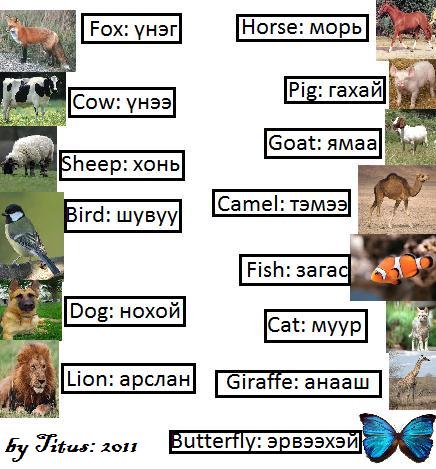
Mongolian Colors:

Mongolian Nature Words:
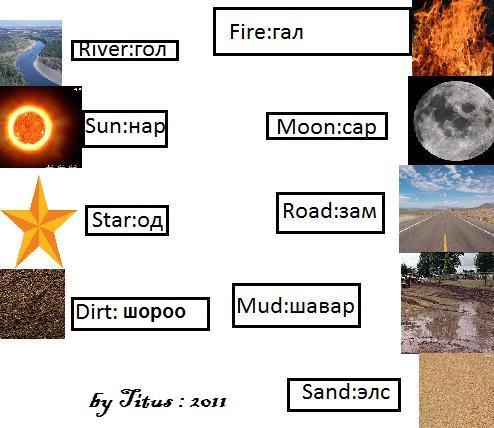
Mongolian Grammar Section
First, lets start with basic syntax.
Intro to Mongolian Syntax.
English is a Subject-Verb-Object (SVO) language. Mongolian (as
with all Altaic languages) is a Subject-Object-Verb (SOV) language.
I have studied Korean (another Altaic language) for ten years and I understand
Korean grammar perfectly; however, Mongolian is proving to be a much more difficult
language than Korean. Hopefully, "we" (you and I) will be able
to work through the intricacies of the Mongolian language, in time. Please
contact me
if you have insights or questions.
One problem with learning the Mongolian language is that the Mongolians do not use the copula (verb "be")
to couple two nouns/subjects.
English example: I am a teacher. "I" is the subject, and
"teacher" is the subject complement. It's two nouns/subjects
coupled together by the copula (verb "be"). See Mongolian
example below:
| English (free translation) |
Mongolian (Cyrillic) |
English (word-for-word) |
Mongolian (Romanized) |
| I am a teacher. |
Би
багш |
I teacher. |
Bi bagsh. |
See???? No copula.
That's doesn't mean that there isn't a copula. There is
(so I'm told). It just isn't used. See example below.
| English (free translation) |
Mongolian (Cyrillic) |
English (word-for-word) |
Mongolian (Romanized) |
| I am a teacher. |
Би
бол
багш. |
I am teacher. |
Bi bol bagsh ! |
But, the word "bol" is NOT in the
dictionary. And I've never heard a Mongolian use it in normal, everyday
speech. So,....
Mongolian language has the existential verb "байх"
which literally means: "to exist", but also functions as a
"helping verb" in the present-continuous tense. See examples
below.
| English (free translation) |
Mongolian (Cyrillic) |
English (word-for-word) |
Mongolian (Romanized) |
| I have a book. |
(надад)
нэг ном байгаа. |
(As for me), a book, exists. |
(Nadad) nek nom baigaa. |
| I am reading at a book. |
(Би)
ном уншиж байна. |
(I), book, reading am. |
(Bi) nom unshij baina. |
Note: Mongolian is a a pro-drop language. That
means that the subject (and sometimes object) can be dropped!
So, instead of saying "As for me, a book exists", Mongolians
would normally just say, "A book exists." And, "As for me"
would be completely understood by the interlocutor.
Also, instead of saying, "I book reading am",
Mongolians would just say, "...book reading am."
Now, for another Subject-Object-Verb sentence. See
examples below.
| English (free translation) |
Mongolian (Cyrillic) |
English (word-for-word) |
Mongolian (Romanized) |
| I eat meat every day. |
би
өдөр бүр
мах идэх. |
I day-every meat eat. |
Bi udur bur budaa idekh. |
See the problem with the Romanization of Mongolian????
It should be like this: "Bi  d d r bur makh
idekh." r bur makh
idekh."
Anyways, you can see the Subject-Object-Verb syntax.
If only it were that easy, though. Mongolians have to
complicate things. See examples below.
| English (free translation) |
Mongolian (Cyrillic) |
English (word-for-word) |
Mongolian (Romanized) |
| I love you. |
би
чамд хайртай. |
I, for you, love-with.
or equally...
I, for you, love-have. |
Bi chamd khairtai. |
You CAN say, "I-you-love" in Mongolian, thusly,
"Bi chamaik xairdag"; BUT, nobody says it that way.
It's just a matter of 'That's the way it is done!' Get
used to it.
Likewise, you can say, "As for me, a son exists" in Mongolian,
thusly, "Nadad khuu baigaa"; BUT, nobody says it that way.
See below for correct way to say, "I have a son."
| English (free translation) |
Mongolian (Cyrillic) |
English (word-for-word) |
Mongolian (Romanized) |
| I have a son. |
би
хүүтай
(байна). |
I, son-with (exist).
or
I exist with a son. |
Bi khuutai (baina). |
Noun/Verb Suffixes
Thankfully, Mongolian doesn't have as many
verb suffixes as Korean does, but they still can be confusing to English
speakers, because English doesn't have them.
Let's explore Mongolian noun/verb suffixes:
Shuu & Dee
(the emphatic particles)
| English (free translation) |
Mongolian (Cyrillic) |
English (word-for-word) |
Mongolian (Romanized) |
| Goodbye. |
баяртай. |
Happiness-with |
Bayartai. |
| Goodbye! |
баяар-шүү-дээ! |
Happiness-!!! |
Bayar Shuu Dee.
or
Bayshdee! (coloq. short form) |
"Goodbye" in Mongolian is always written:
"баяртай;"
However, anyone who has been in Mongolia for any length of time, will tell you
that they hear, "Baishdee" quite a lot.
That
is a contraction of "Bayar shuu dee".
"Shuu"
and "Dee" are emphatic particles, which in English would be expressed
as " ! "
In Korean, it would be: (~찬아)
When "shuu"
and "dee" are used
together, it would be like this " ! ! " in English (double the
emphasis).
Let's look at
some more examples:
| English (free translation) |
Mongolian (Cyrillic) |
English (word-for-word) |
Mongolian (Romanized) |
| It exists. |
байгаа. |
Exists. |
Baigaa. |
| It
exists! |
байгаa-шүү-дээ! |
Exists! |
Baigaashdee. |
| It existed. |
байсан. |
Existed. |
Baisan. |
| It existed! |
байсаншүү! |
Existed! |
Baisanshuu. |
| Come here. |
Наашаа ир. |
To me, come. |
Naashaa ip. |
| Come here! |
Наашаа ир дээ! |
To me, come! |
Naashaa ip dee. |
| I did it. |
Ви хийсэн. |
I did. |
Bi khiicen. |
| I did it! |
Ви хийсэн шүү! |
I did! |
Bi khiicen shuu. |
| What's up? |
Юээн? |
What's...? |
Yueen? |
| Nothing at all! |
Юмгүйдээ. |
Thing-not at all ! |
Yumguidee.
("dee" is added for emphasis). |
| What's new? |
сонин сайхан ю байна ? |
News-pleasant, what exists? |
sonin saikhan yu
baina? |
| Nothing at all! |
Юмгүйдээ. |
Thing-not at all ! |
Yumguidee. |
| Right
(correct) |
мөн |
Right. |
Mun. |
| Right!
(Correct!) |
мөн
дөө. |
Right! |
Mun duu.
("duu" is same as "dee") |
Adjective suffix:
Yumaa
(юмaa)
Yumaa (as far
as I can tell) is different (from "shuu" and "dee"), in that it actually functions as a noun-verb
combination:
"~thing, it is!" (with emphasis).
It is ALWAYS
at the end of the sentence, and seems to follow an adjective.
If you look
in the Chingis Khaan Mongolian-English Dictionary (2012), it translates "yumaa"
as "thing".
However, I
think that it functions as "~thing, it is!" (because the VERB is
ALWAYS last in Altaic languages).
In Korean, it
would be like "~geoshine." (~것이네)
Let's look at
some examples.
| English (free translation) |
Mongolian (Cyrillic) |
English (word-for-word) |
Mongolian (Romanized)
/ Korean |
| It's delicious. |
амттай
байна. |
Taste-with, exists. |
Amttai baina.
맛있어요. |
| It's
delicious! (wow!) |
амттай
юмaa. |
Tasty thing it is! |
Amttai yumaa.
맛있네 |
| How impolite!
(How rude!) |
бүдүүлэг
юмaa. |
Rude thing it is! |
Buduuleg yumaa. |
| Not any birthday greeting came; creatures
like me are such pitiful things! |
- |
Birthday
Greeting (any) came- not; me-such as,
creatures such pitiful things are! |
Turcun udriin mend [ch] irekhgui; nad shig amitad denduu
uruvdultei yumaa. |
See! The adjective precedes the "yumaa",
which means "thing is" or "things are".
HOWEVER, there are exceptions to the "rule" (that I
just made).
It appears that Mongolians use "Yumaa" after nouns
as well !
See example below:
| English (free translation) |
Mongolian (Cyrillic) |
English (word-for-word) |
Mongolian (Romanized) |
| What a blabbermouth,
you are! |
XOBOч
юмaa. |
Blabbermouth, you
are! |
Hovch yumaa. |
| Eternal
life is a done deal. |
- |
Eternal life to
come, it is!
or
Eternal life to become, it is! |
Munkh amitai bolokh
yum. |
| You are such a good
child. |
- |
Good child, you are! |
Sain khuukhed yumaa. |
But, that FIRST example was from a Mongolian repat on Facebook, and
he may have been affected by L2 interference.
L2 interference (in this case) means: he let his English
language learning affect his Mongolian language production.
Or is it a mistake?????
In another example, taken from a text about Jesus Christ (I'm
not a Christian by the way), we see that the word "yum" is preceded by
the word "bolokh" which is a to-infinitive noun, which can mean:
"to come" or "to become" or "to happen".
The last example, my Mongolian teacher gave me.
Let's take a short break and look at this comic that I found
on facebook:
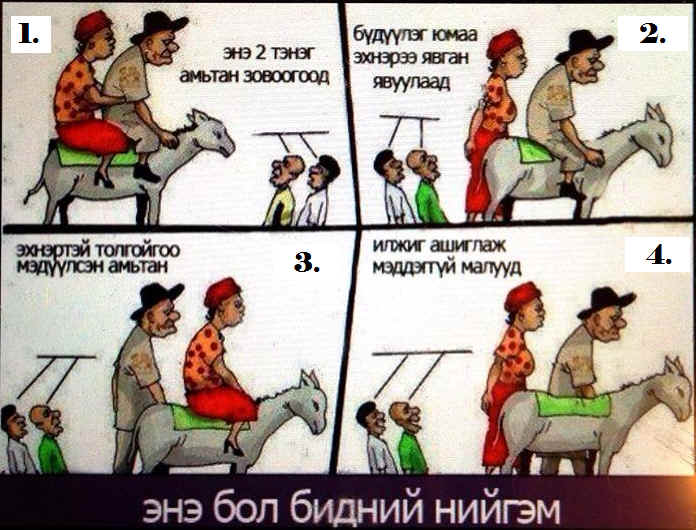
| Mongolian |
English |
| 1. Ene 2 teneg
amitan zovoogood. |
1. These two
fools are torturing that creature. |
| 2. Buduuleg yumaa!
Ekhneree yavgan yabuulaad. |
2. What a
rude thing, he is! He is making his wife go on foot. |
| 3. Ekhneptei
tolgoigoo meduulcen amitan. |
3. You
to-your-wife make-known-who-is-head (boss) creature! |
| 4. Iljig ashiglaj
meddeggui maluud. |
4. You
ignorant-of-using-donkeys animals! |
At the bottom it says: "Ene bol bidnii niigem." =
"This is our society."
So, there you have the copula: bol. I guess it is used
from time to time.
BE CAREFUL, though, "bol" has other meanings/usages
(click here to see).
~bish (биш)
(a noun suffix)
"~bish" means not (but not with a verb)
| English (free translation) |
Mongolian (Cyrillic) |
English (word-for-word) |
Mongolian (Romanized)
/ Korean |
| not this |
энэ
биш |
this not |
Ene bish |
| not
that |
тэр
биш |
that not |
Ter bish |
| not
here |
энд
биш |
here not |
End bish |
| not there |
тэнд
биш |
there not |
Tend bish |
| not in order to
accuse, but in order to save |
- |
accuse-in-order-to not,
but save-in-order-to |
yallakhiin tuld bish,
xarin avrakhiin tuld |
Conjunctions / Connectives
(Please note that there is no "or",
because it is not used).
verb
(to infinitive) |
and |
but |
when
(must have same subject in both clauses) |
when
(or) in case |
because |
so |
| ~х |
~ж |
харин
гэхдээ
гэвч |
~daa
~dee
~doo
~duu |
үед |
учраас
(literally
means "from that reason") |
тиймээс
тийм
учраас |
| явах
(to go) |
Би
явж...
I go and... |
Би
явсан харин...
I went but... |
Би
явахдаа,
Би...
When I go, I... |
Би
явда
тэр
явдаг.
When I go, he goes.
(meaning: Every time
that I go, he
goes.) |
Би
явсан учраас
тэр явсан.
Because I went, he went.
[Literally: I went and for
that reason he went.] |
Би
явсан.
тиймээс
тэр
явсан.
I went, so he went. |
идэх
(to eat)
амьдрах
(to live) |
Би
идэж, би
амьдарч
байна.
I eat and I live. |
Би
амьдарч
байна
гэвч би мах
иддэггүй.
I am living, but I don't eat meat. |
Би
идэхдээ
би
баяртай
байна.
When I eat, I'm happy. |
- |
Би
идсэн учраас
би амьдарч
байна.
Because I ate, I am living. |
Би
идсэн.
тийм
учраас
би амьдарч
байна.
I ate. So, I am living. |
хашгирах
(to crow)
сэрэх
(to awake) |
- |
эр
тахиа хашгирдаг,
гэхдээ би сэрэдэггүй.
The cock crows, but I
don't awake. |
- |
эр
тахиа
хашгирдаг
үед би сэрэдэг.
When the cock crows, I awake. |
эр
тахиа хашгирдаг
учраас
би сэрэдэг.
Because the cock crows, I awake. |
эр
тахиа хашгирдаг,
тиймээс би
сэрэдэг.
The cock crows, so I awake. |
төсөөлөх
(to imagine) |
- |
- |
Би
хүүхэд байхдаа
би нэг
сайхан ертөнцийг
төсөөлөсөн..
When I was a child, I
imagined a beautiful world. |
- |
- |
- |
AH! NO WONDER WHY THE MONGOLIANS GET CONFUSED
BETWEEN "BECAUSE" AND "SO"!!!!!!
The 3 Becauses
Mongolians also have trouble with the word
"because", because they don't understand that the English
"because" has 3 different usages.
See table below for details:
| "Because"
the conjunction |
"Because"
(as an answer to a question) |
"Because
of..." |
| учраас
(Тийм учраас) |
яагаад
гэвэл |
~аас
болж
~ээс
болж
etc. |
| [literally]
"and for that reason" |
[literally]
"If one asks why," |
[literally]
? |
| Би
чамд
хайртай,
учраас
би...
Because
I love, I....
I love you, and for that reason, I... |
Why?
Яагаад?
яагаад
гэвэл, Би
чамд
хайртай.
If
you ask why, I love you.
or
Because I love you. |
чамаас
болж...
Because
of you... |
And the above is only ONE of the reasons that Google translate
sucks!
The Conditional
(~бол,
~вал,
~вэл,
etc.)
| English (free translation) |
Mongolian (Cyrillic) |
English (word-for-word) |
Mongolian (Romanized)
/ Korean |
| If you want me, just
call me. |
-вал |
- |
Minii
hereg garwal zugeer l namaig dyydaarai. |
| If you are 19,
people treat you like a teenager, but if you are 20, (they) will treat you
like (you're in your) 20's. |
-бол |
You 19 if, people
you tens-age-child treating like treat, but 20 if, twenties-age treating
like will treat. |
Chi 19t bol, khumuus
chamd arwan khedtei khuukhedt kharitsj baigam shig kharitsj, kharin 20t
bol, khorin khedtei kharitsj baigam shig l kharitsna. |
| If one believes... |
итгэвэл |
believe-if |
itgewel |
| If I die, |
Би
үхэх бол, |
I die-if |
Bi vxex bol, |
| If a woman is in
front of you naked, it does not mean that she trusts you; but if her face
is without make-up, it means she trusts you. |
-бaл |
(Perhaps) woman in
front of you naked is-if, you trusting meaning not; but face without
make-up is-if, trusting meaning. |
(Xerwee)
emegtei xun umnu chini nutsgen baibal, chamd itgej baina gecen ug
bish; xarin nuuree budaagui baibal, itgej baina gecen ug. |
Can (~ж
чадах)
(to
be able)
| English (free translation) |
Mongolian (Cyrillic) |
English (word-for-word) |
Mongolian (Romanized)
/ Korean |
| I can swim. |
Би
сэлж чадна. |
I talking am-able. |
Bi selj chadna. |
| Can you read? |
Та
сэлж чадах
уу? |
You swimming
are-able? |
Ta celj chadax uu? |
| I can't walk. |
Би
алхаж чадахгүй. |
I walking
am-able-not. |
Bi alxaj chadaxgui. |
| I can play. |
Би
тоглож
чадна. |
I playing am-able. |
Bi togloj chadna. |
| I can't talk now. |
Би
одоо ярьж
чадахгүй. |
I now talking
am-able-not |
Bi odoo yarij
chaxgui. |
The 2 Wants
| to
want sth |
to
want + [to + infinitive] |
| хүсэх |
~маар
~мээр
~моор
~мөөр
+ байх |
| English |
Mongolian |
English |
Mongolian |
I
want water.
(I am wanting water). |
би
ус хүсэж
байна. |
I
want to drink. |
Би
уумаар
байна. |
I
want money.
(I am wanting money). |
Би
мөнгө хүсэж
байна. |
I
want to kiss you. |
Би
чамайг үнсмээр
байна. |
I
want food.
(I am wanting food). |
би
хоол хүсэж
байгаа. |
I
want to die. |
Би
үхмээр байна. |
I
want candy.
(I am wanting candy). |
Би
чихэр хүсэж
байна. |
I
want to get married. |
Би
гэрлэмээр
байна. |
Verb Tenses
Past
(simple) Tense |
Present
(continuous) Tense |
Future
Tense |
Habitual
Tense
(present simple) |
Just
now tense.
((be about to ~)) |
Let's
~
Let me~ |
Imperative |
~сан
~сэн
~сон
~сөн |
~ж
байна |
~на
~нэ
~но
~нө
|
~даг
~дэг
~дог
~дөг
|
~лаа
~лээ
~лоо
~лөө
|
~цгаая
~ья
~ье
|
~ч
~аарай
~ээрэй
~оорой
~өөрөй |
| явсан
went |
явж
байна
be
going |
явна
will
go |
явдаг
go
(regularly) |
явлаа
will
go now
(be about to go)
"I'm
off"
|
явцгаая
Let's go.
явья
Let me go. |
явач
явачээ!
Go!
яваарай
Go please.
|
| авсан
took |
авч
байна
be taking |
авна
will
take |
авдаг
take
(regularly)
|
авлаа
will
take now
(be
about to take) |
авья
Let
me take |
авач
авачээ!
Take!
аваарай
Take please |
| баярласан
rejoiced |
баярлаж
байна
be
rejoicing |
баярлана
will
rejoice |
баярладаг
rejoice
(regularly) |
баярлалаа
will
rejoice now
(Connotatively means: Thank-you).
|
баярлья
Let's
rejoice.
|
баярлач
Rejoice.
баярлаарай
Rejoice please. |
| идсэн
ate |
идэж
байна
be eating |
иднэ
will
eat |
иддэг
eat
(regularly) |
идлээ
will
eat now
(be
about to eat) |
идье
Let's
eat.
I'll eat.
Let me eat. |
идэч
Eat.
идээрэй
Eat please. |
| очсон
visited |
очиж
байна
be visiting |
очино
will
visit
|
очдог
visit
(regularly)
|
очлоо
will
visit now
(be about to visit)
|
очье
Let's visit. |
очич
Visit.
очээрэй
Visit please. |
| өгсөн
gave |
өгч
байна
be
giving |
өгнө
will
give
|
өгдөг
give
(regularly)
|
өглөө
will
give now
(be about to give)
|
өгье
Let's
give
Let me give |
өгөч
Give.
өгөөрөй
Give please. |
| уусан
drank |
ууж
байна
be drinking |
ууна
will
drink |
уудаг
drink
(regularly) |
уулаа
will
drink now
(be about to drink)
|
ууцгаая
Let's
drink.
|
уугач
Drink.
уугаарай
Drink please. |
| уучласан
forgave
|
уучлаж
байна
be forgiving |
уучлана
will
forgive
|
уучладаг
forgive
(regularly) |
уучлалаа
will
forgive now
(be about to forgive) |
уучлья
Let's
forgive. |
уучлач
Forgive.
уучлаарай
Forgive please.
|
| уулзсан
met |
уулзаж
байна
be meeting |
уулзна
will
meet |
уулздаг
meet
(regularly) |
уулзлаа
will
meet now
(be about to meet)
|
Уулзацгаая
Let's meet.
уулзья
Let me meet.
|
Уулзач
Meet.
Уулзаарай
Meet please.
|
Mongolian Active and Passive Voice
Preface: Not all Mongolian verbs have a passive voice,
so here's what I could find:
| Remember that in typically Romanized
Mongolian "u" = ө,
у,
ү .
To deal with this
HUGE problem, I will Romanize differently; thusly:
ө = Ø
y = u
ү
= v
Also, instead of
Romanizing "x" as "kh", I will Romanize
"x" as "x"
Also, instead of Romanizing "c" as "s", I will
Romanize "c" as "c"
|
| Active
Voice |
Passive
Voice |
| үйлдэх
хэв |
үйлдэгдэх
хэв |
| English |
Mongolian |
English |
Mongolian |
| bring into
existence |
bii bolox |
be
brought into existence |
bii bolgox |
| complete
(finish) |
duuctax |
be completed
(be finished) |
duucax |
| forget |
martax |
be forgotten |
martagdax |
| give |
ØgØx |
be given |
ØgØgdØx |
| kiss |
vncex |
be kissed |
vncvvlex |
| know |
medex |
let it be known
that... |
medeelex |
| love |
xairlax |
be loved |
xairlagdax |
| rip |
taclax |
be ripped |
tacduulax |
| save (rescue) |
awrax |
be saved (be
rescued) |
awraglax |
| see |
xarax |
be seen |
xaruulax |
| take |
awax |
be taken |
awagdax |
| teach |
zaax |
be taught / get
taught |
zaalgax |
| understand |
oilgox |
be understood |
oilgogdox |
Please note that the Mongolian language has active voice for
being born (while English doesn't).
In fact, the funny thing is that Mongolian uses active voice
for being born and passive for giving birth.
It really is funny, because mom does all the work (mom is very active) and the
baby is passive (when it is birthed).
TØrØx
= To come into this world (to be born; to be birthed)
TØrvvlex
= To bring into this world (to birth; to give birth)
...for... ~ing....
| Thank
you for.... ~ing.... |
I'm
sorry for.... ~ing..... |
~санд баярлаалаа.
~сэнд
~сонд
~сөнд |
~сaнд уучлаараи.
~сэнд
~сонд
~сөнд |
| English |
Mongolian |
English |
Mongolian |
| Thanks for
helping. |
Тусласанд баярлаалаа. |
I'm
sorry for being late. |
Xожимдосонд уучлаараи. |
The 3 "Likes"
| "like"
the verb |
"like"
the adj. |
What is ~ like? |
| ~ дуртай
(байнa) |
~ шиг |
~ ямар байнa? |
| [literally]
"is liked" |
[literally]
"~like" |
[literally]
How's ~? |
(Ви)
миний аав дуртай (байна).
(I) my
dad liked (is).
Free Translation: I like my father.
Alternate translation:
As far as I'm concerned, my father is liked (by me). |
Ви миний
аав шиг ээ!
I my
dad-like am!
Free Translation: I am like my father. |
Чиний аав ямар байна?
Your dad how is?
Free Translation: What's your father
like?
Alternate Translation: How's your father? |
Contact
me. (for comments and questions)
Compare Mongolian to Other Languages
| Numbers |
| Category |
English |
Japanese |
Korean |
Manchu |
Mongolian |
Hebrew |
Vietnam~ |
| Numbers |
one
two
three
four
five
six
seven
eight
nine
ten |
hitotsu
hutatsu
mittsu
yottsu
itsutsu
muttsu
nanatsu
yattsu
kokonotsu
to |
hana
dul
set
net
taseot
yeoseot
ilgeop
yeodeol
ahop
yeol |
emu
juwe
ilan
duin
sunja
ninggun
nadan
jakvn
uyun
juwan |
nek
hoyeur
gorow
deureu
tau
zorga
dolo
naim
yes (yus)
arau |
echad
shtaim
shalosh
arba
hamesh
shesh
sheva
shmone
tesha
eser
Source
|
mot
hai
ba
bon
nam
sao
bai
tam
chin
mui |
|
Interpolation
Leon's Sources of
Information:
Amazingly, I see
very little similarity in the numbering systems of the Far East! I
mean even most European languages will have similarities in the numbering
systems. Why wouldn't the numbering systems of the Far East be
similar???
RE: Korean
To my surprise, the Korean numbering system bears absolutely NO similarity
with any other numbering systems of the region. (Please note that I
am fully aware that the Korean language has another numbering system which
is based upon the Chinese numbering system, as does Japanese). See
my Korean language page for more details. Some people have asked
me what my sources were. For English and Korean, the source is
myself. I am native English speaker and I lived in Korea for ten
years (see
my blog), and became quite fluent in the language.
RE: Vietnamese
I also lived in Vietnam for a year (see
my blog) and I knew the numbers, but most of the rest had to be looked
up in a bilingual lexicon.
RE: Mongolian
I lived in Mongolia for 5 years (see
my blog), and I knew a lot of the words, the rest had to be looked up
in various bilingual lexicons. The best English-Mongolian online
dictionary is Bolor.
RE: Tibetan
I used to have Tibetan on here, but there just weren't any similarities,
so I have replaced the Tibetan column with a Hebrew column, because
recently I have been amazed to see the similarities between Hebrew and
Mongolian for many words.
RE: Japanese
I don't remember where I got the Japanese words, but a native speaker
named Yoko helped me fix the Japanese mistakes (but what I really want is
the pure, native, proto-Japanese words (before sino-Japanese words were
"borrowed" from Chinese).
RE: Manchurian
As for the Manchurian vocabulary, I had to look very hard for the Manchu
words. One Manchu site is here.
Here is another online
English-Manchu Dictionary.
RE: Hebrew
Main source: Do
it in Hebrew .
|
| Family |
| Category |
English |
Japanese |
Korean |
Manchu |
Mongolian |
Hebrew |
Vietnam~ |
| Family |
family |
ka-zoku |
ga-jeok |
? |
ger bul |
bayt |
gia dinh |
| Family |
mother |
okasa |
omoni |
? |
ej |
em |
? |
| Family |
mom |
haha |
omma |
eme |
ejee |
ima |
me |
| Family |
father |
? |
aboji |
? |
av |
av |
? |
| Family |
dad |
chichi |
abba |
ama |
avaa |
aba |
cha
/ bo |
| Family |
grandma |
sobo |
halmoni |
? |
emee* |
sava |
ba~ |
| Family |
grandpa |
sohu |
haraboji |
yeye |
oboo (eubeu) |
saba |
ong~ |
| Family |
big sister |
ane |
eoni
(f->f)
nuna (m->f) |
? |
Egch
But they usually say:
"Anaa" or "Anee" |
Ah'ot |
chi (gai) |
| Family |
big brother |
ani |
obba (f->m)
heong (m->m) |
agee |
Akh;
but Mongolians usually say:
"Akhaa" or
"Agaa" |
Ah'
Ah' is pronounced the same as Akh. |
anh (trai) |
| Family |
little sister |
imouto |
dong
saeng |
? |
duu |
? |
em gai |
| Family |
little brother |
otouto |
dong
saeng |
? |
duu |
? |
em trai |
| Family |
wife |
kanai
tsuma |
anae
sek shi |
sargan |
ekher, or
ger gii
(literally: home's light) |
ra'yah
ishah
|
vo |
| Family |
husband |
shujin
otto |
nam-pyeon,
(literally: male side) or
uri egi abaa
(literally: my baby's dad) |
? |
neukheur, or
avaa-li er
(literally: fatherly man) |
ba'al
(literally: lord of the house)
|
nguoi chong |
| Family |
daughter |
musume |
ddal |
? |
okhin |
bat |
con gai |
| Family |
son |
musuko |
adeul |
? |
khuu |
ben |
con trai |
|
* Interpolation: I
have wondered why the Mongolians changed "emee" from meaning
'mother' to 'grandma'; and after 3 years of living in Mongolia, I have
concluded that it is because grandma does most of the child-raising, while
'mom' goes out and works. I could be wrong, but it makes sense.
Note: There could be other reasons, such as mothers dying during
childbirth, or dying for other reason, and grandmothers taking on the role
of "mother" for one reason or another. |
| Body
Parts |
| Category |
English |
Japanese |
Korean |
Manchu |
Mongolian |
Hebrew |
Vietnam~ |
| Body |
body |
karada |
mom |
beye |
biye |
guf |
thân hình |
| Body Parts |
head |
atama |
mori |
dalambi |
teolgeoi |
r'sh |
cái đầu |
| Body Parts |
back |
senaka |
heori |
? |
horoo |
gav
ah'or |
lưng |
| Body Parts |
leg |
ashi |
dari |
bethe |
heul |
regel |
chân |
| Body Parts |
eye |
me |
nun |
yasa |
nud |
ayin |
mắt |
| Body Parts |
nose |
hana |
ko |
oforo |
hamar |
af |
mũi |
| Body Parts |
mouth |
kuchi |
ib |
angga |
am |
peh |
miệng |
| Body Parts |
ear |
mimi |
gui |
san |
chikh |
zen |
tai |
| Animals |
| Category |
English |
Japanese |
Korean |
Manchu |
Mongolian |
Hebrew |
Vietnam~ |
| Animals |
animal |
ikimono |
(from
Chinese)
dong mul |
assara jaka
or
ergengge |
mal (animal)
-or-
amitan (creature) |
chayah |
dong vat
-or-
thú vật |
| Animals |
bird |
tori |
se |
gasha |
shoboo |
tzipor
tsipor |
chim |
| Animals |
dog |
inu |
gae |
indahvn |
nokhoi |
kelev |
chó |
| Animals |
horse |
uma |
mal
-or-
sino-Korean (ma) |
morin |
khor / adoo |
sus |
con ngựa |
| Animals |
sheep |
hitsuji |
(from Chinese)
yang |
|
kheoni |
keves |
con cừu |
| Animals |
ox (cow) |
ushi |
so |
ihan |
unee |
shor |
bò |
| Animals |
pig |
buta |
doeji |
|
gakhai |
h'azir |
con lợn |
| Animals |
goat |
yagi |
yeom
so |
|
yamaa |
ez
sa'ir |
con dê |
| Animals |
chicken |
niwatori |
talk |
|
takhia |
tar'n'glet
efroah' |
gà |
| Animals |
tiger |
tora |
horangi
or
sino-Korean (ho) |
tasha |
bar |
tigris |
con hổ |
| Colors |
| Category |
English |
Japanese |
Korean |
Manchu |
Mongolian |
Hebrew |
Vietnam~ |
| Colors |
black |
kuro |
keomeun
ggaman
heuk |
yacin |
khar |
shah'or |
đen |
| Colors |
brown |
cha-iro |
gal (saek) |
? |
bor (unuk) |
chum |
nâu |
| Colors |
dark blue |
ai-iro |
nam (saek) |
? |
kheukh*** |
? |
xanh đậm |
| Colors |
white |
shiro |
hayan
(saek) |
khayan |
tsagaan (unuk) |
lavan |
trắng |
| Colors |
violet / purple |
murasaki |
bora (saek) |
? |
chirneliin yagaan |
sagol |
màu tím |
| Colors |
true blue |
ao |
paran (saek) |
? |
tsenkher (unuk) |
kah'ol |
màu xanh da trời |
| Colors |
sky blue |
sora-iro |
haneul (saek) |
? |
tenger
(unuk) |
t'khelet |
trời xanh |
| Colors |
green |
midori |
nog (saek) |
? |
nogoon
(unuk) |
yark
yarak |
màu xanh
lá |
| Colors |
yellow |
ki-iro |
(from Chinese)
hoang |
suwayan |
shar (unuk) |
tzahv
tsahov |
màu vàng |
| Colors |
orange |
oren-ji |
(from Chinese)
juhoang |
? |
ubarshar (unuk) |
katm
katom |
trái cam |
| Colors |
red |
aka |
bbalgan
(saek) |
? |
olaan
(unuk) |
adam
adom
crimson=
argaman |
đỏ |
| Environment |
| Category |
English |
Japanese |
Korean |
Manchu |
Mongolian |
Hebrew |
Vietnam~ |
| Environment |
sky |
ten /
sora |
haneul |
abka |
tenger |
shamayim |
troi |
| Environment |
earth
(land, soil) |
riku |
ddang |
ba, na |
gazar, kheurs |
adamah |
dat |
| Environment |
air |
(from Chinese)
ku-u-ki |
(from
Chinese)
kong gi |
? |
agaar |
avir |
(from
Chinese)
khong khi |
| Environment |
ocean / sea |
umi |
bada |
mederi |
tengis |
yam |
bien |
| Environment |
gold |
(from
Chinese)
kin |
(from
Chinese)
kim, keum |
? |
altai, altan |
zahav |
vang |
| Environment |
silver |
gin |
eun |
? |
munk, mungun |
kesef |
bac |
| Environment |
rain |
ame, kouu |
bi |
aga |
boroo |
geshem |
mua |
| Food |
| Category |
English |
Japanese |
Korean |
Manchu |
Mongolian |
Hebrew |
Vietnam~ |
| Food |
water |
mizu |
mul |
muke |
os |
mayim |
Nước |
| Food |
food |
tabemono |
shik sa,
eum shik |
buda |
khol |
leh'em
(bread)
khel
ma'akhal |
món ăn |
| Food |
meat
flesh |
niku |
gogi |
? |
max (makh) |
basar |
thịt |
| Food |
dumpling |
manju |
mandu |
? |
buuz (/boze/) |
? |
bánh bao |
| Food |
roll |
ro-o-ru |
roll |
? |
mantu |
? |
bánh mì cuộn |
| Food |
rice |
gohan / raisu |
sal (uncooked)
bab (cooked) |
? |
bodaa |
rez |
cơm
cây lúa |
| People |
| Category |
English |
Japanese |
Korean |
Manchu |
Mongolian |
Hebrew |
Vietnam~ |
| People |
person |
hito |
saram |
niyalma |
khun |
ish |
người |
| People |
male |
dansei |
sut |
~a~ |
er~ |
zakhar |
? |
| People |
female |
josei |
am |
~e~ |
em~ |
neqeva |
? |
| People |
king |
ou / kingu |
Gun
Han |
han |
kHan |
melekh |
nhà vua |
| People |
man |
otoko |
(from Chinese) namja |
haha |
er khun |
ish (person)
gever (young man)
adam (mankind) |
đàn ông |
| People |
woman |
on-na |
(from
Chinese) yeoja |
hehe |
em khun |
ishah
ra'yah |
đàn bà |
| People |
friend |
tomodachi |
chingu |
anda |
and /
naiz |
yadiyd
h'aver |
người bạn |
| People |
teacher |
(from Chinese)
sen sei |
(from
Chinese)
gyo sa
& seon saeng |
sefu |
baksh |
mora (f)
more (m) |
giáo viên |
| People |
child |
kodomo |
ai |
juse |
khuukhed |
yalda (f)
yeled (m) |
đứa trẻ |
| Verb |
| Category |
English |
Japanese |
Korean |
Manchu |
Mongolian |
Hebrew |
Vietnam~ |
| Verb |
be (copula) |
dearu / iru
/ aru |
ida |
? |
bol |
hayah
nim'tza |
được |
| Verb |
exist, have |
motsu |
issda |
bi /
bimbi |
bi,
baikh |
hit'kayem |
hiện hữu |
| Verb |
love |
aisuru |
sarang-hada |
hairambi |
khairtai |
ahav |
yêu
thương
luyến ái
thích |
| Verb |
do or make |
suru / tukuru |
hada |
arambi |
khiikh |
asa
asha |
làm |
| Verb |
work |
hataraku |
il-hada |
weilembi |
ajilikh |
avad
asak |
công việc |
| Verb |
play |
asobu |
nolda |
? |
teokleokh |
sichek |
chơi |
| Verb |
eat |
taberu |
meokda |
jembi |
idekh |
akhal |
ăn |
| Verb |
believe |
sinjiru |
mid-da |
? |
itgikh |
he'emin |
tin |
| Verb |
know |
siru |
alda |
? |
medekh |
yada |
biết |
| Ponouns |
| Category |
English |
Japanese |
Korean |
Manchu |
Mongolian |
Hebrew |
Vietnam~ |
Subject Pronoun
(Nominative case) |
I / we |
watashi-wa
watashitachi-
wa |
nae(ga)
/ uri(ga) |
bi / muse |
bi / bid |
? |
tôi |
You
Ye
Ya'all |
anata-wa
anatatachi-wa |
tangshin
/ tangshideul |
si / suwe |
tanar |
al
at/aten (f)
ata/atem (m) |
? |
Thou
Ye |
sonata
sonatatachi-wa |
ni(ga)
neohideul |
? |
chi |
? |
? |
One
They |
hito-wa
karera-wa |
keu
keudeul |
i / ce |
ter |
hen (f)
hem (m) |
? |
Direct Object Pronoun
(Accusative case) |
me / us |
watashi-ni
watashitachi-
ni(o) |
ni (ga) / uri (reul) |
mimbe / musebe |
namaik |
i |
? |
you
ya'll
ye |
anata-ni(o)
anatatachi-
ni(o) |
tangshineul |
simbe
suwembe |
tanig |
? |
? |
thee
ye |
sonota-ni(o)
sonatatachin-
ni(o) |
neoreul |
? |
chamaig |
? |
? |
one
them |
hito-ni(o)
karera-ni(o) |
keureul |
imbe
cembe |
tuuniig |
? |
? |
Indirect Object Pronoun
(Dative case) |
to me / for me |
watashi-e
watashi-
notameni |
na-hante
na-wi-e |
minde / musede |
nand |
li |
? |
to you
for you |
anata-e
anata-
notameni |
tangshin-
hante
tangshin-
wi-e |
sinde / suwende |
tand |
lekh (f)
lekha (m) |
? |
to thee
for thee |
sonata-e
sonata-
notameni |
neo-hante
neo-wi-e |
? |
chand |
? |
? |
to/for one
to/for them |
hito-e,
hito-
notameni,
karera-e,
karera-
notameni |
keu-hante
keu-wi-e |
inde
cende |
tund |
to her = la
to him = lo
to them (m) = lahem
to them (f) = lahen |
? |
Possessive Pronouns
(Genitive case) |
my / our |
watashi-no
watashi-
tachi-no |
nae / uri |
mini
musei |
minii
manai |
sheli
shelanu |
? |
| your |
anat-no
anatatachi-
no |
tangshin-
eui |
sini
suweni |
tanii |
shelakh (f)
shelakhen
shelkha (m)
shelakhem |
? |
| thy |
sonata-no |
ni |
? |
chinii |
? |
? |
his
her
their |
kare-no
kanozyo-no
karera-no |
keu |
ini
ceni |
tunii |
shelo (m)
shelah (f)
shelahem (m)
shelahen (f) |
? |
| |
|
|
|
|
|
|
| |
|
|
|
|
|
|
| |
|
|
|
|
|
|
| Life |
| Category |
English |
Japanese |
Korean |
Manchu |
Mongolian |
Hebrew |
Vietnam~ |
| Life |
life |
seikatsu / kurashi |
alm |
? |
ami |
chaim
chayiym |
doi song |
| Life |
name |
namae |
ireum |
gebu |
ner |
shem |
ten |
| Life |
home/house |
ie |
jib |
boo,
booi |
ger
(yurt),
buunii zakh (market) |
bayit |
nha |
| Life |
good |
tame |
joh-eun |
sain |
sain |
tov
naiym
tuv |
tot |
| Life |
bad |
warui |
nappeun |
ehe |
muu |
ra
garua |
xau |
| Life |
poop / manure |
un-chi
dai ben (from China) |
ddong
dae byun (from China) |
? |
baas |
deshen |
? |
| Life |
pee / urine |
oshikko
shou ben (from China) |
shi
so byun (from China) |
? |
shees |
sheten |
? |
| Cosmos
& Mythology |
| Category |
English |
Japanese |
Korean |
Manchu |
Mongolian |
Hebrew |
Vietnam~ |
| Cosmos |
Moon |
tsuki |
dal |
? |
sar |
yareach
sahar |
mặt trăng |
| Cosmos |
Sun |
taiyo |
hae / nal
(day) |
xun |
nara |
shemesh |
mặt trời |
| Cosmos |
Star |
hoshi |
byeol |
ushiha |
od |
kokhav |
ngôi sao |
| Mythos |
Dragon |
? |
mireu
/mee-ruh/ |
? |
loo
/low/ |
mir'shaat
i'taah
d'rakon |
? |
| Mythos |
Demon-
dragon of the abyss;
cosmic sea of space |
? |
? |
? |
Arakho
Arkhan |
Arkhas
Abadon |
? |
| Mythos |
The abyss |
? |
? |
? |
Gun Ganga |
Tehom |
? |
| Mythos |
Hell |
? |
? |
? |
Tam |
Sheol |
? |
| Mythos |
Heaven |
? |
? |
? |
Tenger |
Eden |
? |
| Interrogatives |
| Category |
English |
Japanese |
Korean |
Manchu |
Mongolian |
Hebrew |
Vietnam~ |
| ? |
What |
nani |
muo, museun |
ai, aibade |
yu, yum |
mah
bamma |
? |
| ? |
When |
itu |
onje |
fonde |
khizee |
matay |
? |
| ? |
Where |
doko |
eodi |
aba |
khanaa |
heykhan |
? |
| ? |
Why |
naze |
we |
aiman |
yagad |
lamma |
? |
| ? |
Who |
dare |
nugu |
we |
khen |
mi
lemi |
? |
| ? |
How |
dou / don-na /
donoyouni |
odogge |
absi, adarame |
yaj |
eykh
kama
ma |
? |
| ? |
How much
How many
|
ikua /
dordake takusan
ikusu /
doredake o-oku |
eolmana
myeot gae
|
udu |
yamar
kheden
|
kama~ |
? |
|
Other |
| Conjunction |
When |
~toki |
~ddae |
~sidende |
~daa,
dee, doo |
ki
bezman she
ka'asher
kshe~ |
? |
| Preposition |
to, toward |
-e |
~ro |
? |
~ro |
l~
el / al
l'ever |
? |
| My sources
include:
(1) My own knowledge of the English and Korean languages
(2) Bolor
English-Mongolian--Mongolian-English Dictionary
(3) English-Japanese
Dictionary
(4) English-Manchu
Glossary
(5) English-Tibetan
Dictionary
(6) English-Vietnamese
Dictionary |
Miscellaneous Mongolian Sentences
| Remember that in typically Romanized
Mongolian "u" = ө,
у,
ү .
To deal with this
HUGE problem, I will Romanize differently; thusly:
ө = Ø
y = u
ү
= v
Also, instead of
Romanizing "x" as "kh", I will Romanize
"x" as "x"
Also, instead of Romanizing "c" as "s", I will
Romanize "c" as "c"
Lastly, я
= ya and е
= ye |
| Mongolian |
Word-for-word
Translation |
| Chamaig tacarxai oxin gexiin
orond vzesgelentei gej xelex xvniig congooroi.
utcaa tacalcan
ch ergeed yaridag xvniig
noircondo xichneen vzecgelentei(g) chin xarax gej shuniig untalt
unguruux(sp?) xvniig
enxriileed dØxØn
der chin vncen xvniig
gantcaardcan vyed (
үeд)
chin bvxel yertØnts
(ертөнц) chin baij
chadax xvniig
xezeed ch chamaig
caixnaar xarj chadax xvniig
chi tvvntei baiga
boloxoor, terend xichneen jargaltai baigaagaa ilerniilj chaddag xvniig
chamaig xalamjilj
vrgelj derged chin baix xvniig
gantsxan chamd l
xaiptai garts chi miniix gej xelex xvniig
congooroi.
|
Please choose to be called a
"cool" girl, instead of being called a pretty girl.
His phone turned-off, keep-talking-(with-you) person,
When you sleep, looking at your beauty, all night passing-up-sleep
person,
Caressing, drawing-near-to-your-pillow-to-kiss-you person,
In case of your feeling lonely, can-be-your-whole-world person,
Always-can-see-the-good-part-of-you person,
Because you have each other, can-express-how-much-happiness-he-has
person,
Affectionately-constantly-beside-you person,
Only-for-you-having-love, saying-you-are-mine person;
Please choose (such a person). |
| Erchvvd meddeg ch boloocoi:
-Xerwee ter uurlaad yawaad ØgwØl,
araac ni yaw.
-Xerwee ter uruul ruu
chn xarwal, tvvniig vnc.
-Xerwee ter chamaig
tvlxwel, ØØrØØcØØ
tvvniig tewreed xezee ch bitgii yawuul.
-Xerwee ter chamaig
yecØn
shidiin vgeer xelj baiwal, tvvniig tewreed xaiptai gedgee xel.
-Xerwee ter uurtai
baiwal, EGDYYTEI gedgiig ni xel.
-Xerwee ter chamaig
tooxgui baiwal, anxaarliig hi tat.
-Xerwee ter duugai
baiwal, yu bolcong ni acuu.
-Xerwee ter ØØriigØØ
muu talaac ni xaruulj baiwal, xØØrxØn
gedgiig ni tvvnd xel.
-Xerwee ter uilj
baiwal, hug her and never feel lonely.
-Xerwee ter chinii mØriig
derlej baiwal, tongoigood tvvniig vnc.
-Xerwee ter chamd
nuutsaa xelwel, xadgal.
-Xerwee ter chinii
nvdrvv warj baiwal, exelj xarxaa bolitol ni nvdrvv ni xar.
-Xerwee ter chamaig
canaj baina gewel, tvvnd vnexeer xetsvv bain gecen vg.
-Xerwee chi tvvniig
gomdoobol, zvrxnii sharx xezee ch arilaxgui.
-Xerwee ter bvx zvilee
duuccan gewel, gantsxan bolomj ch gecen cetgeliin gvnd nuugdaj baigaa.
-Emegtei xvniig
oilgiye gewel, nac chn svrexgui. |
Men, please come to understand:
-Perhaps, if she gets angry and goes away, go after her.
-Perhaps, if she looks at your lips, kiss her.
-Perhaps, if she pushes you, from yourself (to yourself?) hug her and
never leave.
-Perhaps, if she speaks to you through magic words, hug her and tell
her that you love her.
-Perhaps, if she is angry, WITH DISGUST tell her.
-Perhaps, if she ignores you, attentively woo her.
-Perhaps, if she is silent, ask what happened.
-Perhaps, if she herself shows her bad side, say beautiful words to
her.
-Perhaps, if she understands (you?), hug her and never feel lonely.
-Perhaps, if she rests her head on your shoulder, bend and kiss her.
-Perhaps, if she tells her secret to you, keep it.
-Perhaps, if she is looking into your eyes, in the process of looking
back, stop looking into her eyes.
-Perhaps, if she says she is missing you, know that it is really hard
for her to say.
-Perhaps, if you hurt her feelings, don't leave her heart-broken.
-Perhaps, if she says all things are all over, become lonely and say
all the deep feelings that are hiding.
-If you say, "Let me understand women," your age is
insufficient.
|
Mongolian Names
(and meanings)
IMPORTANT BACKGROUND INFORMATION:
I start with my favorite: Names to ward off evil spirits.
It's my favorite, because I absolutely LOVE mythology.
Mongolian tradition has it that stillbirth and sudden-infant-death syndrome
(SIDS) are cause by an evil, unborn, female spirit, named Ada. Ada
tries to steal the souls of young children, mostly infants.
Sources:
(1) Journal
of Ethnology and Folklorists
(2) Fandom
Wiki
(3) Wikipedia
Compare that to the Hebrew mythology that states that Adam's
first wife (in the spirit, before he was born in the flesh) was named Lilith.
Adam abandoned Lilith, because she was not subservient to him, and she
became the demon of the same name (Lilith), who stole the souls of infant
children of Adam and Eve.
Source: http://faculty.washington.edu/scstroup/Lilith.html
Mongolian Names that parents give to their
children in order to ward off
evil spirits
En-bish "Not This"
Ter-bish "Not That"
Ner-Gui "No Name" (I know somebody with this name); I love the irony.
Khun-bish "Not human"
Hich-bish "No-one"
[Note: This new generation (2020+) of children do not have those
names. However, the generation before them is replete with such
names. It is interesting how in just one generation, a people can overcome
such superstitions.]
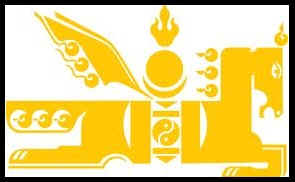
Mongolian Names from Tibetan language:
*DAYS of the WEEK
Yes. The names of days of the week are very common names for people as
well...
Davaa (literally means Moon); Also the name of "Monday"
Myakmar (literally means Mars): Also the name of "Tuesday"
Lkhakva (literally means Mercury): Also the name of "Wednesday"
Purev (literally means Jupiter): Also the name of "Thursday"
Baasan (literally means Venus): Also the name of "Friday"
Byamba (literally means Saturn): Also the name of "Saturday"
Nyam~ (literally means Sun): Also the name of "Sunday"
*TIBETAN BUDDHSM
Anand = sublime bliss
Badamlyanhwa = Lotus Flower
Bazar = thunderbolt; lightning
~dari = Tara (Buddhist goddess)
Baljinnyam = Buddhist god of fortune, wealth, prosperity
Danzan = ??? (Danzan
Ravjaa (1803-1856), officially known as the Fifth Noyon Incarnate Lama of the
Gobi Desert, is perhaps Mongolia's most beloved saint.)
Dashnyam = Buddhist god of energy and cheerfulness
Dorj = thunderbolt; thunder
Garid = Garuda (Buddhist god of Birds)
Indra = Buddhist god of the sky???? (See also: Indraanil [ sapphire ] in
Mongolian)
Khas~ = Buddhist cross
~maa = mother (means "mother" but connotes female; possibly insinuating the potential
motherhood of the individual)
Soyon(goo) = enlightenment (beautiful)
Sumber = (Mt. Sumer)
Tumen = 10,000 (All Things) [In
Chinese WanZi, In Korean ManJa, In Japanese ManJi]

Mongolian Names of Character
[[ Foreword: the meanings of some of the following
names have been forgotten by most modern Mongolians. Some are not in the
Mongolian-English lexicon. So, I have had to surmise the meanings, via my
own research. ]]
Amar (Serenity; Tranquility) [ > ancient Mesopotamia: amar = immortal, eternal]
Amgalan (Serene, quiet, tranquil)
Amina (could be related to the Mongolian word Ami, which means
"life"; or the word Amin, which means "self")
(I see
a possible cognate: Amino (amino acids are the basic building blocks of
life))
Angir(maa) (Mandarin Duck (female))
Ankh(maa) (First ((female))
Anu (I cannot find a definition; and no Mongolian
knows the meaning)
[
possibly derived from ancient Mesopotamia: Anu means Sky]
{P.S., Let it be known that Anu was as the name of a famous
Mongolian queen.}
[It
could be related to the Mongolian word Anuur, which means
"prudent"; but I think it came from Mesopotamia. I am fully
aware that the Mesopotamian god Anu was male and that the Mongolian name "Anu"
seems to be reserved for females only; However, I still attest that Mesopotamia
was the origin of the word.]
Ariun~ (Pure)
Arvin (Bountiful)
Az (Luck; lucky)
Badral (Prosperity)
Baatar (Hero)
Bat~ (Tough; Well-built; Hard; Sturdy)
Bayar (Happiness)
~bileg (Gift)
Bilguun [m] (Sage)
Bilgee [f] (Sagess)
Bilguudei (Sagacious one)
Buren~ (Complete)
Buyan (Virtue; Merit)
~chimeg (Decoration)
Chingun or Chinguun (Truthful)
Chinsanaa (True Idea)
Dayan (Contemplation; Meditation)
Delgerekh (Flourish)
Demberel (Good omen)
Emuujin (??? Femininity ???) - [Possibly from Em meaning female; and/or Emekteilek
meaning feminine]
Erkhem (Important)
Ermun (??? Masculinity ???) - [Possibly from Er meaning male; and/or Eremgii
meaing manly]
Enguun [not in the dictionary; possible related to Engui meaning:
endless, limitless, immeasurable]
Enkh (Peace)
Ider (Young and Vigorous)
Itgel (Faith)
Itgelt (Trustworthiness)
Ivelt (Sympathetic; Supportive; Protective)
Jargal (Joy)
~jin (Balance Scales) [To me, it signifies that one should live a balanced life]
Khachiun (??? Quaint ???) [Possibly from Khachin, meaning quaint,
peculiar]
Khos~ (couple; double) [I have a student named Khosbayar = Double
Happiness]
Khuslen (Desire; Wish)
Magnai (Foremost; The one in the lead/front)
Mergen (Wisdom; Sagacity)
Misheel (Smile)
Munkh (Eternity; Eternal)
Namun or Namuun (Quiet, Still)
Nandin (Cherished)
Ninjin (No Mongolian knows what it means)
[ >
possibly derived from ancient Mesopotamia where Nin
means Lady-goddess.
Jin means balance scales. Reminds me of Nike. So, Nin-jin could mean
Lady Justice. ]

Nomun or Nomuun (Bibliophile)
Ochir (Official person)
Sanaa (Idea)
Saikhan (Pleasant)
Setsen (see "Tsetsen")
Sumber [Name of a Mountain in Mongolia] (?Church? Sum means
Church/Chapel/Temple; ?Ramrod? Sumbe means ramrod)
Tavilan (Fate)
Tenuun (Vast)
Togt (Stability)
Tsetsen (Genius)
Tsogt (Ember)
Tugs (Perfect) Female
Tuguldur (Perfect) Male
Tulga (Trivet--an iron tripod that stands over a fire for cooking;
Metaphorically it might signify stability)
Tuvshin (level, grade, standard)
Ulemj (Great)
Ulzii (Blessings)
Undral (Gushing)
Uran(goo) = (Exquisite)
Yesui (Nine) [>>Middle Ages Mongolian; Source: Wikipedia] (Nine is
an auspicious number in Mongolia)
Zaya (Destiny)
Zolboo (Character; Disposition)
Mongolian Names From Nature
Baigal (Nature): Baigal is a common Mongolian name. Usually female.
| Category |
Gen |
Name |
Meaning |
Pics |
| Animals |
f |
Khulan
|
The dictionary
translates it as "wild ass"; but it is not a very becoming
translation, especially since the name is used for many
Mongolian females. It is actually a relative of the domestic
donkey, but it is such a beautiful animal, that if you were to see it,
you would want to name your daughter after the animal as well. So,
here is a link for you to see some more photos:
|

Mongolian
Khulan Conservation Association
|
| m |
Khangal |
Mustang;
Wild horse |
|
| f |
Maral
GooMaral
Maralgoo |
Hind; doe
Beautiful doe
Doe-beauty |
|
| f |
Minj |
Beaver
(not a common name) [I had a female student with this
name]. |
|
| Colors |
n/a |
Altan~
Altangerel |
Golden
Golden light |
|
| n/a |
MØNGØN~
Munguldei
Mungun-shagai |
Silvery
Silvery one
Silver-ankle bones |
|
| f |
Khaliun |
Creamy brownish color (color of
Khulan) |
|
| n/a |
Tsagaan |
White |
|
| Cosmos |
n/a |
Nar
Naran |
Sun
Sunny |
 |
| n/a |
Od
Odgerel
Odmaa (f)
Odon (f)
Odkhuu (m) |
Star
Star-light
Star-mom
Stary
Star-son |
|
| n/a |
Orchlon |
Universe |
|
| n/a |
Sansar
Sansarmaa (f) |
Cosmos
Cosmos-mom |
|
| f |
Sar
Saran
Sarangerel
Saruul |
Moon
Moon-like
Moon-light
Moon-mountain |
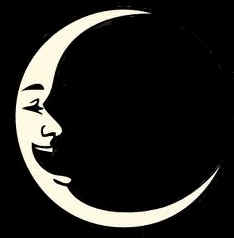 |
| n/a |
Tergel |
Full moon |
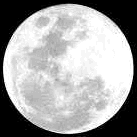
|
| f |
Tsatsralt |
Radiate |
|
| n/a |
Tselmeg |
Clear blue sky; Skye |
|
| f |
Tsolmon |
Venus; the morning star |
|
| n/a |
Tumen |
All things; all that is |
|
| Earthly |
m |
Chingis
Chingun
Chinguun |
"Chingis" (Genghis)
is said to be a variation of Tengis (by some), only bigger. Some
translate "Chingis Khaan" as "Universal King".
I would translate it as "Terrestrial King" or "King of
the Earth".
"Chingun" may be a variation of "Chingis". |

Chingis Khaan |
| n/a |
Dalai |
Sea |
|
| n/a |
Dolgion |
Wave |
|
| n/a |
Khangai |
Mountain Forest |
|
| n/a |
Orgil |
Mountain Peak |
|
| f |
Solongo |
Rainbow |
|
| n/a |
Sumber |
The mythical
Buddhist Mt Sumer (The Buddhist Garden of Eden) |
|
| n/a |
Taiga |
Taiga |
|
| n/a |
Tengis |
Ocean |
|
| n/a |
Uul |
Mountain |
|
| Flowers |
f |
Bertsetseg |
Mountain aster (a pretty
flower, common to Mongolia) |
 |
| f |
Saraana Tsetseg |
Lily |
|
| f |
Sarnai |
Rose |
|
| f |
Tsetseg |
Flower |
|
| Gemstones
and
Jewels |
n/a |
Erdene |
Gemstone |
|
| n/a |
Anar |
Garnet |
|
| ? |
Badmaarag |
Ruby |
|
| f |
Binderiya |
Aquamarine (NOT Sapphire)
[Source:
"Chingis Khaan,
completely revised, fourth edition 2012, Mongolian-English
Dictionary", which contains at least 150,000 words translates the
word "Binderiyaa" as "Beryl", which is mainly
composed of Beryllium+Aluminum-Silicate, but can have different names
depending upon the colour of the impurities in the stone.] |
|
| n/a |
Bolor |
Crystal |
|
| f |
Indraanil |
Sapphire
[notice the Buddhist word "Indra" (god of the
sky)] What color is the sky? Same as sapphire, right?
Could there be an etymological link there? I think so! |
 |
| n/a |
Margad |
Emerald |
|
| m |
Molor |
Topaz |
|
| f |
Nomin |
Lapis |
|
| f |
Oyu(n) |
Turquoise |
|
| n/a |
Sondor |
Necklace |
|
| f |
Suvdaa |
Pearl |
|
| Materials |
m |
Bold |
Steel |
|
| f |
Gan |
Steel |
|
| m |
~chuluun |
monolith; lithic; stone; set in
stone |
|
| n/a |
Tumur |
Iron |
|
| Rivers |
n/a |
MØRØN
(Murun)
AKA:
Delgermurun |
{pronunciation
is IMPORTANT:
APA
/m r r n/
: or... n/
: or...
IPA
/m r r n/} n/}
[Chingis Khan Dictionary (2012) says that it means
"river", but I'm not convinced, because the word for river is
"gol". I think it is related to the word MØRØK:
"carp"]
Carp River |
|
| f |
ORXON
(Orkhon) |
[The
ONLY closely related word to Orkhon is "orkhikh" which means:
to give up, to abandon, to forsake, leave.]
[Perhaps, since the Orkhon River leads AWAY from Mongolia to the north,
and eventually joins with the Selenge River, which flows into Lake
Baikal (Baigal); my guess is that the meaning is: the "River that
Abandons Mongolia".]
Abandoning River |
|
| f |
CELENGE
(Selenge) |
[The
ONLY closely related word to Selenge is "celex" or "selekh",
which means to swim.]
Swimming River |
|
| f |
TVVL
(Tuul) |
[possibly
related to the word Tul meaning taimen (a giant relative of
salmon)]
Taimen River |
|

OTHER MONGOLIAN NAMES
from NATURE...
Delgerekh (Flourish)
Magnai (Forehead)
Tsatsralt (Radiate)
~tuya (Shine)
Zul (Shine; Rays)
Contact me
Mongolian Song Translated Into English
READ THIS FIRST:
In the video, the first two words of the song have been
omitted.
Romanization
(of the Mongolian Cyrillic)
a
= a in father
e = e in bed
i = ee in bee
o = o in go
 = o in
money = o in
money
 = u in put
= u in put
u = u in flu
æ = ae in sundae |
Word-for-word
Translation |
English
"Free" Translation |
Hun buhen huuhed
bækhdaa
H rw rw  k sækhnaar
t k sækhnaar
t s s  ld ld k-ch k-ch
Amdralin  ng-ayas ng-ayas   rch-l rch-l k-s k-s  r r
b -d -d l
sanaa-ch ho-vir-dak. l
sanaa-ch ho-vir-dak.
Butekh butekh-gui zuil
 l l n
bædak n
bædak
Buderch aldsan-ch s kh-r kh-r l-gui l-gui
  rt
bægaa gotral bok-him-dlaa rt
bægaa gotral bok-him-dlaa
bosdad buu gar-gaa-ræ
DKH: (Chorus)
Hærlaj yawvsen hundee hayagds n
bal n
bal
Oilaad bukdiik mar-taa-ræ
Margaash chamæk shinekhen ochral huleene
Magat-gui chi iloo jargan
Hin nig nd chi g nd chi g mds mds n
b n
b l l
Oojoo se-tre-leer ooch-laa-ræ
Hatookhan ok næzdaa hils n b n b l l
M riig-n
tevred un-see-ræ riig-n
tevred un-see-ræ
DKH: (Chorus)
 rchl rchl ngiin ngiin
 ng ng urgelj
urgelj   rch-l rch-l k-s k-s  r r
Gerel-gegee ruu bid-niik h -t -t l-n l-n
Amdralin orsgal bo-tsakh-gui b l l kh kh  r r
Tsak-m ch uneteik
mid-ree-ræ. ch uneteik
mid-ree-ræ.
DKH: (Chorus) |
People
all children are-when
Beautiful world imagine.
Life's color and mood changes;
Thoughts/ideas transform.
Possible / impossible things many exist.
Fail / lose / kneel DON'T.
Self-by are, depression / despair-in,
Others-to don't release.
(Chorus)
Lover gone person-by abandoned if,
Weep completely, please forget.
Tomorrow you-for new chance will be secured.
Doubtlessly, you surplus will be happy.
Some one you resent if,
Deliberately mind-via forgive please.
Firm/hard word friend-to said if,
Gamble 'n Embrace 'n Kiss please.
(Chorus)
Universe's color forever changes,
Light bright toward us leads.
Life's current/flow regress-not may;
Time-breath pricey know please.
(Chorus)
|
When
everyone is a child,
[They] imagine a beautiful world.
Life's color and mood changes;
Thoughts & ideas transform.
Many possible &
impossible things exist.
Don't fail, lose, or kneel.
When you have depression or despair,
Please don't show it to others.
Chorus: It's all
right. It's all okay. x2
If you've been dumped by
your lover,
Cry it all out, then forget it please.
Tomorrow, a new opportunity waits for you.
Maybe you'll be even happier.
If you are disappointed in someone,
With an open heart, forgive 'em please.
If you said a hard word to your friend,
Give 'em a hug and kiss 'em please.
Chorus: It's all
right. It's all okay. x2
[The] universe's color
keeps changing,
Leading us towards the bright light.
Life's flow may not turn back;
[You can't turn back time].
Please know each precious moment.
Chorus: It's all
right. It's all ok. 5x |
| Mongolian
Lyrics to "It's All Right"
by Kiwi
Хүн бүхэн хүүхэд байхдаа
Хорвоог
сайхнаар төсөөлдөг ч
Амьдралын өнгө аяс өөрчлөгдсөөр
Бодол санаа
ч хувирдаг
Бүтэх
бүтэхгүй
зүйл
олон байдаг
Бүдэрч
алдсан ч сөхрөлгүй
Өөрт
байгаа
гутрал
бухимдлаа
Бусдад бүү гаргаарай
ДХ: It's all right
It's all ok everybody say it *2
Хайрлаж
явсан хүндээ
хаягдсан
бол
Уйлаад бүгдийг
мартаарай
Маргааш
чамайг
шинэхэн
учрал хүлээнэ
Магадгүй чи илүү жаргана
Хэн нэгэнд
чи гомдсон
бол
Уужуу
сэтгэлээр
уучлаарай
Хатуухан үг найздаа
хэлсэн бол
Мөрийг
нь тэврээд үнсээрэй
ДХ: It's all right
It's all ok everybody say it *2
Орчлонгийн өнгө үргэлж өөрчлөгдсөөр
Гэрэл гэгээ
рүү биднийг хөтөлнө
Амьдралын
урсгал
буцахгүй болохоор
Цаг мөч үнэтэйг
мэдрээрэй
ДХ: It's all right
It's all ok everybody say it *5
|
My other cool links, that you might want to check out:
Learn
Chinese
Learn Korean
Learn English
(for anybody, even native speakers!)

I promote Sodon Chimee, LLC, because I attended that place and I
enjoyed learning there.
I do not receive ANY money from Sodon Chimee, LLC for the
above promotions.
Click on the logo in order to visit the website of Sodon
Chimee, LLC.
| |

English |
|

Spanish
|

Korean |

Mongolian |

Chinese |
|
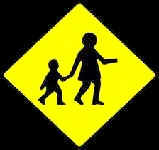
Parents of
Homeschool
|
|

Halloween
|
|

Thanksgiving
|
|

Winter Solstice
|
|

Christmas
|
|

New Years
|
|
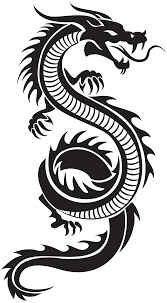
Chinese Lunar
New Year
|
|

Valentine's
|
|

|
|

Easter
|
|

All About
Dr. Seuss
|
|

Roald Dahl
|
|

Prepper's
Pen |
|

Ways to
Help
Leon's Planet
|
|